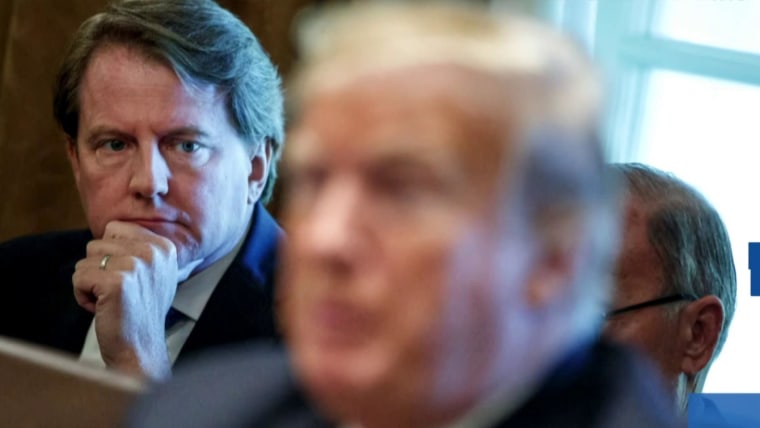When it comes to obstruction allegations surrounding Donald Trump, former White House Counsel Don McGahn is not just another witness: few figures play as important a role in the Mueller report as the former White House counsel. As we've discussed, the Republican lawyer spoke with investigators for dozens of hours, and the special counsel's findings cited McGahn more than 150 times.
In some of the episodes in which Trump allegedly obstructed justice, the claims of suspected criminal misconduct are based heavily on what the former White House Counsel told investigators.
Indeed, as the special counsel's findings made clear, McGahn very nearly resigned because the president directed him to "do crazy s**t," including an incident in which, according to McGahn, Trump pressed the lawyer to push the Justice Department to derail the Russia investigation by getting rid of Mueller and creating a false document to cover that up.
Not surprisingly, Congress subpoenaed McGahn to testify. The former White House counsel refused to comply after Trump ordered him to ignore the lawmakers' summons. But is that legal? Can a president direct someone not to comply with a lawful federal subpoena? As NBC News' Pete Williams reported, a federal judge ruled late yesterday that Trump exceeded his authority -- and McGahn must obey the subpoena issued by the House Judiciary Committee.
Federal District Court Judge Ketanji Brown Jackson said McGahn must appear before Congress but retains the ability to "invoke executive privilege where appropriate" during his appearance. The judge did not put her own ruling on hold, but the Trump administration will likely seek one to put the effect of her ruling on hold while it pursues an appeal."It is clear to this Court for the reasons explained above that, with respect to senior-level presidential aides, absolute immunity from compelled congressional process simply does not exist," Jackson said in her ruling."Presidents are not kings," she added.
The full ruling is online here. As Rachel explained on the show last night, "This is a ruling that is designed to be read by people who are outside this case. This is a ruling, I think, in the specific, that is designed to remind us all what kind of government the Constitution spells out for us and why, when all else fails, we should be able to count on the judiciary, the court system, the rule of law, to protect the Constitution, to make sure that the law is upheld. To make sure that nobody is above the law."
So, what happens now?
McGahn's lawyer said in a statement that his client "will comply with Judge Jackson's decision unless it is stayed pending appeal. The DOJ is handling this case, so you will need to ask them whether they intend to seek a stay."
In other words, the former White House counsel will honor yesterday's ruling and obey the congressional subpoena unless another court puts this decision on hold. That is a distinct possibility.
As NBC News' report added, "The Justice Department said it will appeal the ruling and will seek a stay of Jackson's order while it does so."
White House Press Secretary Stephanie Grisham said administration officials are "confident that the important constitutional principle advanced by the administration will be vindicated."
I'm not altogether sure what "important constitutional principle" she's referring to. In fact, by all appearances, the only important constitutional principles at play are the ones the federal judge articulated yesterday while roundly rejecting the White House's radical legal posture.
